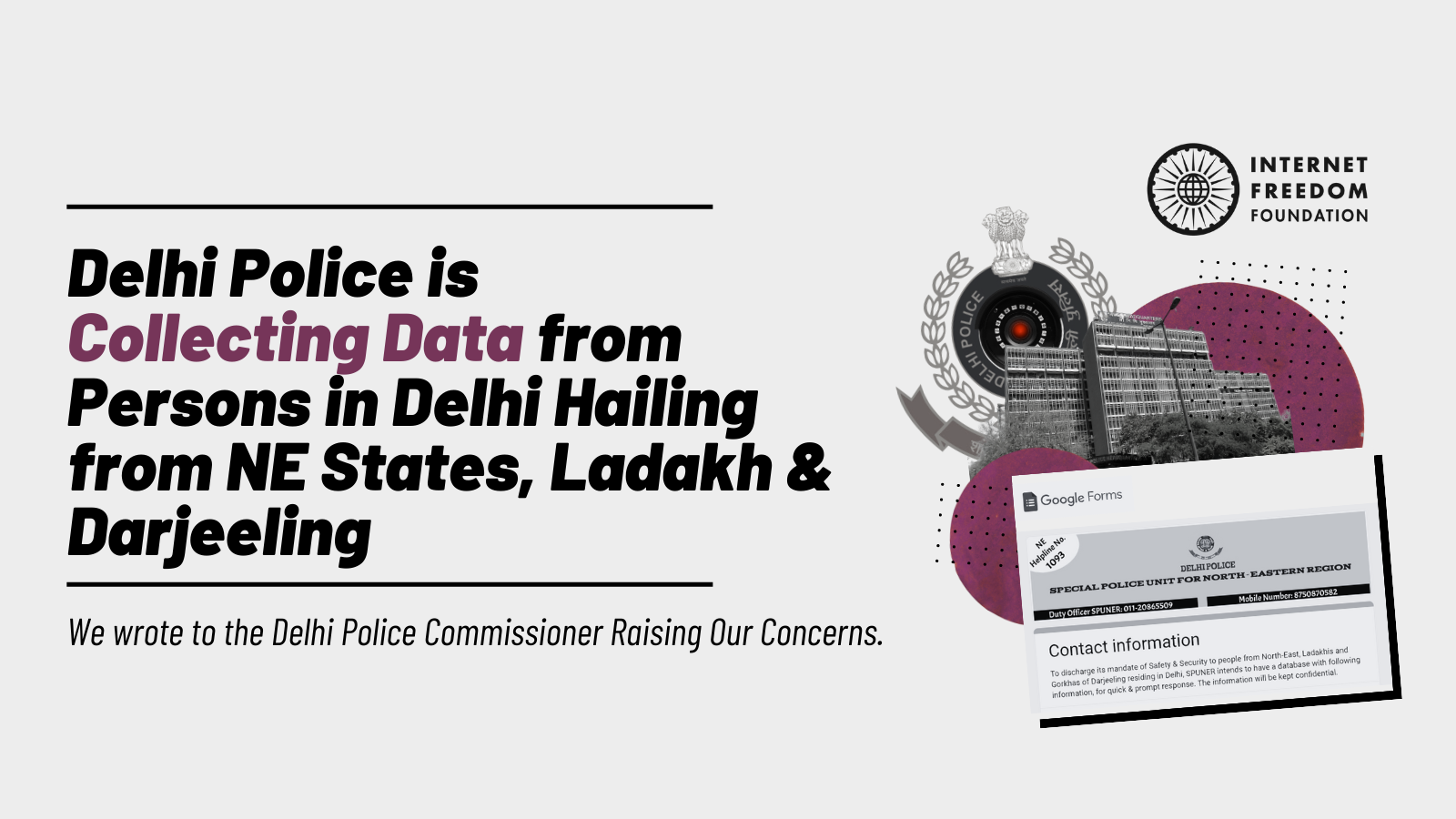
tl;dr:
The Delhi Police has reportedly initiated a data collection exercise, through which they have asked Delhi residents from the Northeastern states, Darjeeling and Ladakh to provide their personal information through a Google Form. The exercise, purportedly aimed at enhancing security and safety, has had alarm bells ringing, as it is discriminatory, with no nexus to the stated objectives, as well as is in violation of citizens' constitutional rights. In light of this, we have written to the Police Commissioner of Delhi, highlighting our concerns. We have also filed an RTI Application with the Home Ministry, stating our apprehensions and requesting information regarding this data collection exercise.
Background
As per news reports, the Special Police Unit for North-Eastern Region (“SPUNER”), which operates under the Delhi Police, has initiated a data collection exercise this past month. It involves collecting personal data from residents in Delhi hailing from the Northeastern states, Darjeeling and Ladakh through a Google Form that is now being circulated across social media and communication platforms. Enhancing “safety & security and [for] better policing,” and to “have a database… for quick & prompt response” are the justifications that have been provided for the data collection.
Those required to fill out the Google Form have been requested to furnish the following pieces of personal information: name, present address, name of local police station, district, email ID, gender, date of birth, phone number, community/tribe name, and occupation. As per the news report cited above, this exercise is to ensure that no clashes take place in the city as several communities from the Northeast reside here and there’s currently an ongoing turmoil in Manipur.
Why should you care?
As mentioned in our letter to the Police Commissioner of Delhi, while the importance of ensuring safety and security of all residents is paramount, particularly those belonging to the marginalised communities, any measure implemented for purposes of law and order by law enforcement agencies must safeguard citizens’ rights and should adhere to Constitutional values at its core.
Several concerns plague this initiation of data collection exercise, chief of which are:
- The exercise raises questions about its necessity, motivation, and effectiveness. It is critical to understand the nexus between the data collected and the objectives that this exercise is attempting to achieve, and whether the former facilitates the latter.
- More importantly, as it involves vulnerable communities and disproportionate collection of their personal data, this exercise indicates a prima facie violation of Constitutional rights, including but not limited to Article 14 (right to equality), Article 15 (right against discrimination), Article 19(1)(d) (right to freedom of movement), and Article 21 (right to privacy).
- This data collection exercise has led to legitimate apprehensions about the creation of separate databases, racial profiling, and targeted policing. Further, though it is stated the information will remain confidential, without the proper safeguards, there exists the possibility of misuse of the collected data in the event it falls into the hands of miscreants.
- Further, in Justice K.S. Puttaswamy (Retd.) vs. Union of India, the Supreme Court has recognized the right to privacy as a fundamental right enshrined under Article 21 of the Constitution, and has directed that any action encroaching upon the privacy of an individual must be evaluated through the touchstone of legality, necessity and proportionality. On the face of it, this data collection exercise seems to fall foul of all three prongs of proportionality.
- Lastly, as stated above, there are concerns regarding what might happen if the information contained within this database leaks or falls into the wrong hands, and the varied harms to the communities concerned that can ensue, including but not limited to, targeted harassment, misrepresentation and identity frauds, stigmatization and margination, profiling, etc.
We wrote to the Police Commissioner of Delhi and filed an RTI Application
In the context of the above-mentioned concerns, we wrote to the Police Commissioner of Delhi voicing these apprehensions. We have sought clarity on the measures being employed and have expressed our availability for further assistance, should it be required, in order to minimize the harms being perpetuated through such measures.
To ensure that this data collection exercise and pursuant database created is in line with our constitutional values as well as adheres to the substantive and procedural safeguards under applicable laws, we have also filed an RTI Application with the Ministry of Home Affairs, under whose authority Delhi Police operates, requesting the Ministry elucidation on the data collection exercise. We requested for the following information:
- Please provide information on the legal authority (laws, rules, notifications, circulars) that empowers the Delhi Police to collect personal information from citizens by way of a Google Form.
- Please provide a comprehensive list of objectives that the Delhi Police aims to achieve through the establishment of this database, and how the collection of personal information from residents of these specific regions contributes to the stated objectives of strengthening security and methods of policing.
- Please provide information on whether filling out the Google Form and participating in the data collection exercise is mandatory for residents in Delhi hailing from Northeastern states, Darjeeling, and Ladakh.
- Please provide copies of material, letters, documents, or other communication placed before you that led you to order the initiation of this data collection exercise.
- Please provide information on whether similar data collection exercises have been conducted in the past involving other communities or groups. If yes, please provide details of such exercises, the communities involved, the stated objectives, and any relevant documents.
- Please provide information on what procedural safeguards have been embedded in the data collection exercise to ensure the right to privacy remains intact, and that the collected data remains secure and is not misused, and whether there will be provision for modification and/or deletion of the data provided.
- Please provide a detailed overview of the processes through which the collected data will be managed, accessed, and potentially utilized by law enforcement agencies.
- Please provide information on whether the collected data will be shared with any government agencies, third-party organizations, private entities, or external agencies. If so, please explain the reasons for sharing the data and identify the parties with whom the data might be shared.
The road to safety paved with Constitutional encroachments?
In light of our concerns raised, we have urged the Police Commissioner of Delhi to reconsider this exercise. Notwithstanding the good intentions, such an exercise can have far-reaching ramifications for the communities concerned, and would result in violations of their Constitutional rights.
We will keep you updated on the responses from the Police Commissioner of Delhi and the Ministry of Home Affairs.
This post has been authored by IFF Litigation Intern Raghu Gagneja, and reviewed by Associate Litigation Counsel Radhika Roy.
Important Documents

